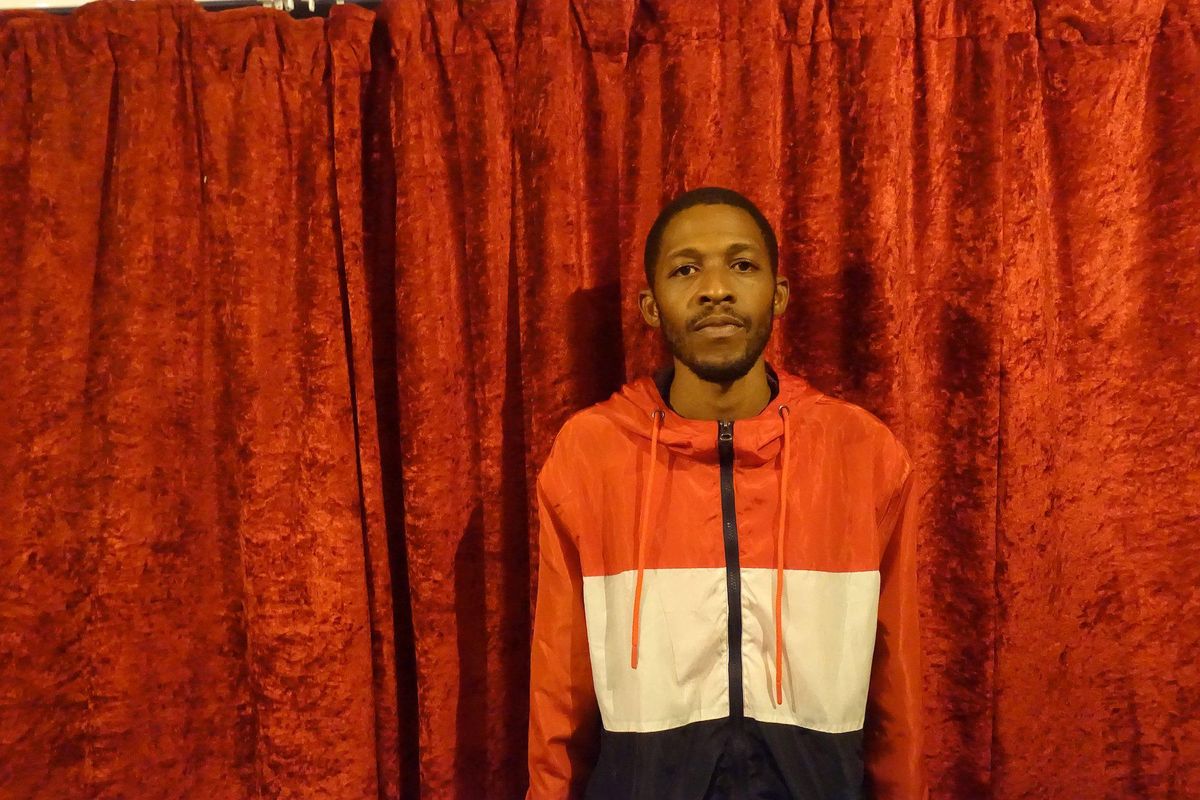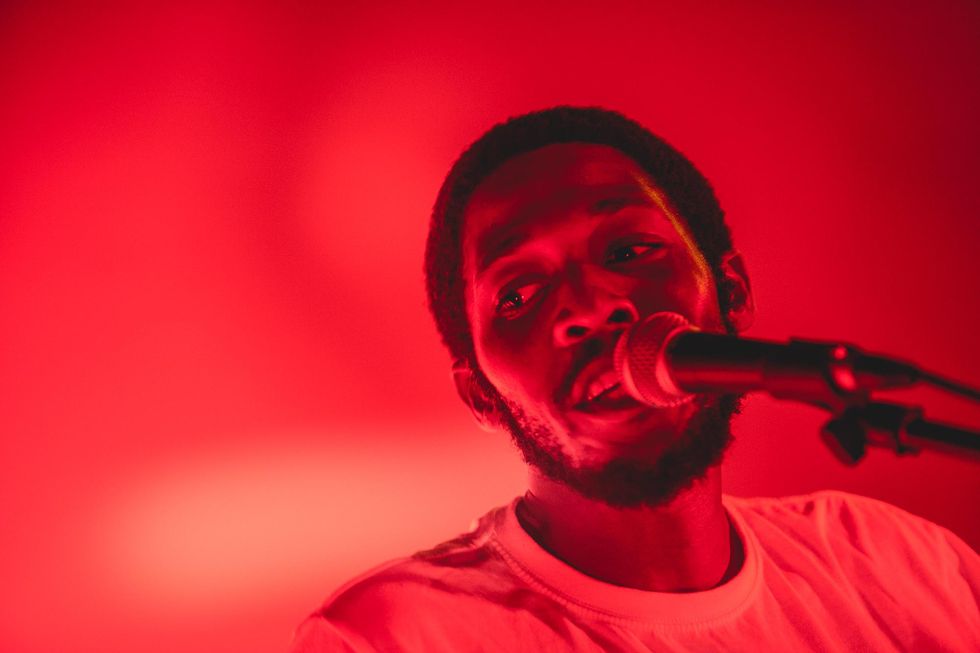Meet Nandele, the Producer Shaping Mozambique's Alternative Music Scene
In his two latest releases, the Mozambican artist continues his tireless quest of shaping the modernity of Mozambique into music.

Nandele.
Nandele used to be a geeky '80s kid. He loved to snoop around the sound system of his father, the general director of the Mozambican National Radio. One day, while poking with the vinyl player components, the little boy accidentally broke the plastic cover that topped the device.
He ran away from home and found shelter at his uncle's house, a solution that only makes sense in a child's mind. "My dad called my uncle and asked to talk to me," Nandele recalls. "He called me back home and when I got there, instead of telling me off, he just taught me how that machine worked. This planted the seed of my interest in this thing called music".
Since that day, Nandele has played the double role of a testimony and one of the main acts in the modern Mozambican music scene. His latest feats in this spectacle are the EP FF (Cotch International) and the LP Plafonddeinst (Already Dead Tapes), released in October and September of last year, respectively.
Both albums coalesce overlapping utterly abstract auras with frameworks that span from bleep techno to eerie soundtracks. They show a prolific production with tracks that lie somewhere between an Aphex Twin bootleg and a cyberpunk RPG video game soundtrack. In this adventure, the lead character is a boy wandering in Mozambique with oozy soundscapes, somber textures, and arpeggios from other dimensions.

If Nandele's works are a sonic experiment pointing out to the future, this is due to his tireless quest in shaping the modernity of Mozambique into music—refusing Western mannerisms of electronic music with all the EDM-esque drops, heavy beats and danceable hooks.
Nandele lives in Maputo and the everyday city sounds are a source of inspiration to his compositions, from rhythmic sampling to synth melodies. "When I hear the cars making noises in the streets, this is music for me; I know it is morning when I hear the coal vendor shouting outside my home," he says.
The 2020 LP follows two other releases: Likumbi (2019) and Argolas Deliciosas (2015). Altogether, they give rise to an involuntary African trilogy (consider the EP FF as a spin-off). It is a journey that, revolving around Mozambique, links the dots between the artist's most intimate experiences and outer space boundaries.
In Argolas Deliciosas, Nandele sets his feet off earth on a beat making voyage. "This album is about a Mozambican who goes to the Planet Donuts," he explains, stressing that some producers from his country have laughed at him when they first heard this idea. "There isn't a single African person who has ever been in space, but within music everything is possible."
This afrofuturistic tribute to the seminal Detroit beat maker J Dilla and his quintessential Donuts goes beyond the concept. Nandele's debut is made with uneven drumbeat sequences and a sophisticated sampling style—deflecting song excerpts and detaching them from their sources. It is a continuous bric-a-brac game inspired by the possibilities opened by Dilla and other great hip-hop producers.
Nandele : FFyoutu.be
Nandele kept the wandering spirit in his second album. But Likumbi is rather a dive into his own self. "This album is my thesis, this is where I had to leave my comfort zone." The title is actually a word from the Makonde people that stands for a rite of initiation, a traditional experience intended to transform adolescents into men. Nandele joined this ceremony and, years later, recreated it in his own way.
From intro to outro, the 12-track album offers a sneak peak through the ritual according to Nandele—now revisiting the experience with bleeps and noisy sound bits. The overwhelming makonde percussion is transmuted into several drum layers, traditional chants become dark vocal shots or TV show's samples and the mystery ambiance that surrounded the once young Nandele has been transformed into eerie textures.
Father and son
Nandele dedicated his second album to his son on a short note published in his Bandcamp page. "My son picked the tracks for my first album, Argolas Deliciosas," says the artist. "I played each track I had written, many of them, and he would tell me 'yes' or 'no'". The valuable father-son time spent together is something that Nandele used to do with his own father, for whom the music was also a symbol of liberty. "If I make music today is because of my dad," Nandele says.
It was around the record player where the artist was introduced to the songs of freedom by the likes of Marvin Gaye and Fela Kuti. "This is the black president!" his father used to exclaim while they were listening to the Live! album featuring Africa 70, Fela Kuti, and Ginger Baker.
Despite that, music was not a top priority at Nandele's house. His father's guitar was barely touched at home. He was a "freedom fighter," as the artist says. And while the 1992 peace treaty put an end to the two decades of civil conflict in Mozambique, there was still a lot of work to do in the years upfront: the reconstruction of a war-torn country.
The '90s were also supposed to be the decade for the rebirth of Mozambican music, but a severe economic crisis held off most artists from making a living out of it. Youngsters like Nandele, however, were into music just like a kid with a new toy brought from overseas.

"Our parents used to travel to foreign countries and they recorded songs and music videos at hotels, like Snoop Dogg videos", Nandele recalls. "And we used to throw some hip-hop encounters at the National Journalist Union's basement, in Maputo".
Nandele jumped from the mics to the drums in the following years. He wanted to be a rockstar like Dave Grohl or Chino Moreno and stood his ground with Jimi Hendrix when his hip-hop head friends called rock music a "white thing."
It was not until the mid 2000s when the artist finally had an encounter with electronic music. While listening to a Massive Attack album, he knew for sure it was possible to patch up the black music upbringing, the early years of rapping and the drumming abilities he had been developing as a musician.
From the first tracks to the most recent albums, Nandele has not only developed a sophisticated knowledge of beat making that leans his productions towards noise music or sound sculptures, but he has also forged a whole idea about Mozambican music.
"Mozambique is still an unknown country, but our music is universal," Nandele theorizes, while remembering the record listening sessions with his father. "We need to be ourselves. By doing that, Salif Keita, Papa Wemba and Fela Kuti succeeded in music. They didn't want to fit in, and Mozambican music was not made to fit it in—it was made to be appreciated by those who love music".
- Batuk, The Pan-African Creative Collective You Need To Know ... ›
- 20 Black Punk Bands You Need To Listen To - OkayAfrica ›
- Mozambique's Pacas Raps Over Drake & Jai Paul Beats In ... ›
- Mozambique Independence Day Playlist Pt. 2 - OkayAfrica ›
- On The Map: A Weekend Immersed In Maputo's Music Scene ... ›
- 11 Things To Know About Heavy Metal in Mozambique - OkayAfrica ›
- National Mourning Ends, as Investigation into Fatal Mozambique Ferry Accident Continues - Okayplayer ›

